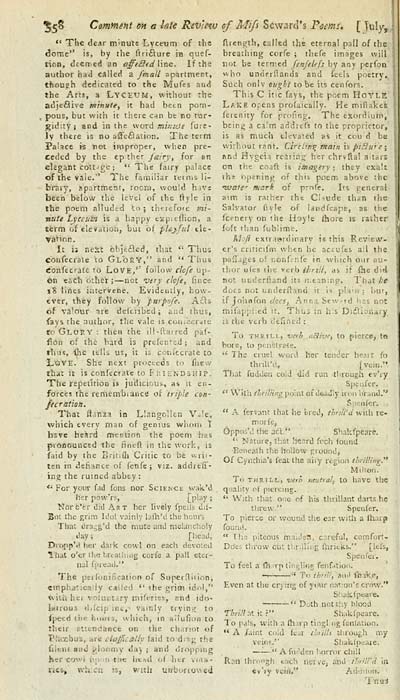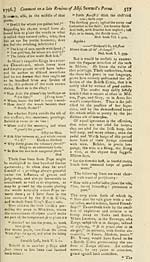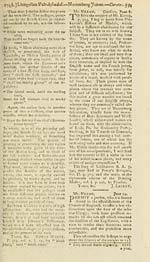Download files
Complete book:
Individual page:
Thumbnail gallery: Grid view | List view

35^ Comynent oh a late Review of Mifs Seward's Pacm. [ Jul)', I
ftrength, called the eternal pall of the
breathing corfe ; tliefe images will
not be termed fenfelffs by any perfon \
" The dear minute Lyceum of the
dotTic" is, by the ftriflure in quef-
tion, deemed ?.n affeSifdWne. If the
author had called a fmall sparinient,
tfcough dedicated to the Mufes and
the Arts, a Lyceum, without the
adjeflive minute, it had been pom-
pous, but with it there c^n be no tur-
bidity ; and in the word miKzcte ("ure-
Jy there is no aife£iation. The term
Palace fs not improper, when pre-
ceded by the ep ther fairy, for an
elegant cottage ; •' The fairy palace
ofthevaie." The familiar teinis li-
brary, apartmcTSf, rocn-i, would h;jve
been below the level of the ftyle in
the poem alluded to; therefoie mi-
nute Lyceuin is a happy exp. eltion, a
ttrm of elevation, but of plcjful tit-
▼aHor.
It is nest objtflcd, that " Thus
cbnfecrate to Gl'ory," and " Thus
eonfecrate to LoVE," follow clcfe up-
on each othet ; — not "verj/ elofe, lince
18 tines intervene. Evidendy, how-
ever, they follow by purpofe. A£ls
of valour are defciibed ; sad thus,
■fays the author, the vale is con.bcrjte
to Gloky : then the i!!-ftaired paf-
fidn of the bard is prefenred j and
thu«, i^c tells us, it is eonfecrate to
Love. She next proeteds to (liew
that it is eonfecrate to FitiENDSHiF.
The repetition is judicious, as it en-
forces the remembiaiice of iriple con-
/ecration.
That ftanza in Llangollen VJe,
which every man of genius whom I
have heard mention the poem has
pronounced the fined in the work, !s
laid by the Brinfli Critic to be wrii-
ten tn defiance of fenfe; viz. addrtff-
ing the ruined abbey :
*' For your fad fons nor Science vv'ak'd
her pow'rs, LP^'^y >
Nor e'er did Art her hvely fpells dil-
BiH the grim Idol vainly lafh'd the hours
Thai lira^g'd the mute and melrfncholy
day ; [liead,
DroppM her dark cowl on each devoted
That o'er the breathing corfe a paU eter-
nal fpread."
The pcrfoniFication of Superdi'inn,
emphatically called " the grinn idol,"
<viiii hci volur.tary iniferies, and ido-
kirous dilcip inc.- vamly tryiny: to
Ipeed the boors, which, in ailufion to
tiieir ?tttndance on the chariot of
Fhccbus, are cLaffKally (aid to drsg the
filtnt and i>loomy da) ; and dropping
her cow i i';vii) tilt; litv,d of htr voia-
ries, wh.cn ;s, with unbunowed
"ho undcrflands
is poetry,
Such only ought to be its cenfors.
This C itic fays, the poem HoYLE
Lake opens prolaically. He mifiakes
ferenity for profmg. The exordium,
being a ca!m addrefs to the proprietor,
is as much elevated as it cou d be
without rant, Circitfi^ main is piilw e •
nnd Hygcia rearinf; her chrvlla! a'tins
cm the coaft is imagery: they exalt
tht opening of this poem above lit
tvaie- mark of prnff. Its generri
aim is rather tht CIsude than ilit;
Salvator ftyle of landfcape, as v. >:
fct-nery on the Hoyle (hore is raihe;
foft than fublime.
Myji extraordinary is this Revie>v-
er's criricifm when he accufes ail the
paffages of nonfinfe in which our ;iu-
thor ufes the verb ihrilJ, as if fee did
not ucderftand its n.eanmg. That ke
docs not underiland it is pUui ; but,
if Johnfon ctaes, Anna Sew-rd has not
mifapphed tt. Thus in h.s Diilionary
is the verb de'fiiled :
To THRILL, -virb tiBive, to pierce, to
bore, to penfetrate.
" The cruel word her tender he?ir fo
thriU'd, [vein."
That fudden cold did run through ev'ry
Speiifer.
" With thrilling point of deadly iron Ivrand."
Snenfer.
" A fervatit that he bred, ihnll'd with re-
morfe,
Oppns'J the act" Shakfpeare.
" Nature, tl^at heard fv7ch found
Beneath the hollow ground,
Of C) iichia's feat the aiiy region thrilling.*^
Milton.
Til THRILL, -verh neutral, tO have tllC
quality of piercing.
•' With that one of his ihrillant darts he
threw." Spenfer.
To pierce or wound the ear with a Iharp
fount).
" lbs piteous maiilea, careful, comfort-
Do'es throw out tlir;lling flirieks." [lefs,
Spenfer.
To feel a (h.irp tingling fenfation.
" To thrill, aiiil (bak,e,
Even at the cr; ;iig of your nat:on's crow."
Shak-fpeare.
" Doth nottiiy blood
ThriH at it ?" Sh.'ik.fpeare.
To pais, with a (harp tingling fenlation.
•* A /aint cold fear iLiilh through my
veins." Shakipcarc.
—- — " A fucMen liorror chill
Ran thr!i"gh t;ich iiervc; and tlnUVd in
«v'jy vein." Ad'.lr!()ii.
Tnu'i
ftrength, called the eternal pall of the
breathing corfe ; tliefe images will
not be termed fenfelffs by any perfon \
" The dear minute Lyceum of the
dotTic" is, by the ftriflure in quef-
tion, deemed ?.n affeSifdWne. If the
author had called a fmall sparinient,
tfcough dedicated to the Mufes and
the Arts, a Lyceum, without the
adjeflive minute, it had been pom-
pous, but with it there c^n be no tur-
bidity ; and in the word miKzcte ("ure-
Jy there is no aife£iation. The term
Palace fs not improper, when pre-
ceded by the ep ther fairy, for an
elegant cottage ; •' The fairy palace
ofthevaie." The familiar teinis li-
brary, apartmcTSf, rocn-i, would h;jve
been below the level of the ftyle in
the poem alluded to; therefoie mi-
nute Lyceuin is a happy exp. eltion, a
ttrm of elevation, but of plcjful tit-
▼aHor.
It is nest objtflcd, that " Thus
cbnfecrate to Gl'ory," and " Thus
eonfecrate to LoVE," follow clcfe up-
on each othet ; — not "verj/ elofe, lince
18 tines intervene. Evidendy, how-
ever, they follow by purpofe. A£ls
of valour are defciibed ; sad thus,
■fays the author, the vale is con.bcrjte
to Gloky : then the i!!-ftaired paf-
fidn of the bard is prefenred j and
thu«, i^c tells us, it is eonfecrate to
Love. She next proeteds to (liew
that it is eonfecrate to FitiENDSHiF.
The repetition is judicious, as it en-
forces the remembiaiice of iriple con-
/ecration.
That ftanza in Llangollen VJe,
which every man of genius whom I
have heard mention the poem has
pronounced the fined in the work, !s
laid by the Brinfli Critic to be wrii-
ten tn defiance of fenfe; viz. addrtff-
ing the ruined abbey :
*' For your fad fons nor Science vv'ak'd
her pow'rs, LP^'^y >
Nor e'er did Art her hvely fpells dil-
BiH the grim Idol vainly lafh'd the hours
Thai lira^g'd the mute and melrfncholy
day ; [liead,
DroppM her dark cowl on each devoted
That o'er the breathing corfe a paU eter-
nal fpread."
The pcrfoniFication of Superdi'inn,
emphatically called " the grinn idol,"
<viiii hci volur.tary iniferies, and ido-
kirous dilcip inc.- vamly tryiny: to
Ipeed the boors, which, in ailufion to
tiieir ?tttndance on the chariot of
Fhccbus, are cLaffKally (aid to drsg the
filtnt and i>loomy da) ; and dropping
her cow i i';vii) tilt; litv,d of htr voia-
ries, wh.cn ;s, with unbunowed
"ho undcrflands
is poetry,
Such only ought to be its cenfors.
This C itic fays, the poem HoYLE
Lake opens prolaically. He mifiakes
ferenity for profmg. The exordium,
being a ca!m addrefs to the proprietor,
is as much elevated as it cou d be
without rant, Circitfi^ main is piilw e •
nnd Hygcia rearinf; her chrvlla! a'tins
cm the coaft is imagery: they exalt
tht opening of this poem above lit
tvaie- mark of prnff. Its generri
aim is rather tht CIsude than ilit;
Salvator ftyle of landfcape, as v. >:
fct-nery on the Hoyle (hore is raihe;
foft than fublime.
Myji extraordinary is this Revie>v-
er's criricifm when he accufes ail the
paffages of nonfinfe in which our ;iu-
thor ufes the verb ihrilJ, as if fee did
not ucderftand its n.eanmg. That ke
docs not underiland it is pUui ; but,
if Johnfon ctaes, Anna Sew-rd has not
mifapphed tt. Thus in h.s Diilionary
is the verb de'fiiled :
To THRILL, -virb tiBive, to pierce, to
bore, to penfetrate.
" The cruel word her tender he?ir fo
thriU'd, [vein."
That fudden cold did run through ev'ry
Speiifer.
" With thrilling point of deadly iron Ivrand."
Snenfer.
" A fervatit that he bred, ihnll'd with re-
morfe,
Oppns'J the act" Shakfpeare.
" Nature, tl^at heard fv7ch found
Beneath the hollow ground,
Of C) iichia's feat the aiiy region thrilling.*^
Milton.
Til THRILL, -verh neutral, tO have tllC
quality of piercing.
•' With that one of his ihrillant darts he
threw." Spenfer.
To pierce or wound the ear with a Iharp
fount).
" lbs piteous maiilea, careful, comfort-
Do'es throw out tlir;lling flirieks." [lefs,
Spenfer.
To feel a (h.irp tingling fenfation.
" To thrill, aiiil (bak,e,
Even at the cr; ;iig of your nat:on's crow."
Shak-fpeare.
" Doth nottiiy blood
ThriH at it ?" Sh.'ik.fpeare.
To pais, with a (harp tingling fenlation.
•* A /aint cold fear iLiilh through my
veins." Shakipcarc.
—- — " A fucMen liorror chill
Ran thr!i"gh t;ich iiervc; and tlnUVd in
«v'jy vein." Ad'.lr!()ii.
Tnu'i
Set display mode to: Large image | Transcription
Images and transcriptions on this page, including medium image downloads, may be used under the Creative Commons Attribution 4.0 International Licence unless otherwise stated. ![]()
| Early Gaelic Book Collections > Ossian Collection > Gentleman's magazine, and historical chronicle > Volume 66, Part 2 > (30) |
|---|
| Permanent URL | https://digital.nls.uk/79422131 |
|---|
| Description | Selected books from the Ossian Collection of 327 volumes, originally assembled by J. Norman Methven of Perth. Different editions and translations of James MacPherson's epic poem 'Ossian', some with a map of the 'Kingdom of Connor'. Also secondary material relating to Ossianic poetry and the Ossian controversy. |
|---|
| Description | Selected items from five 'Special and Named Printed Collections'. Includes books in Gaelic and other Celtic languages, works about the Gaels, their languages, literature, culture and history. |
|---|

